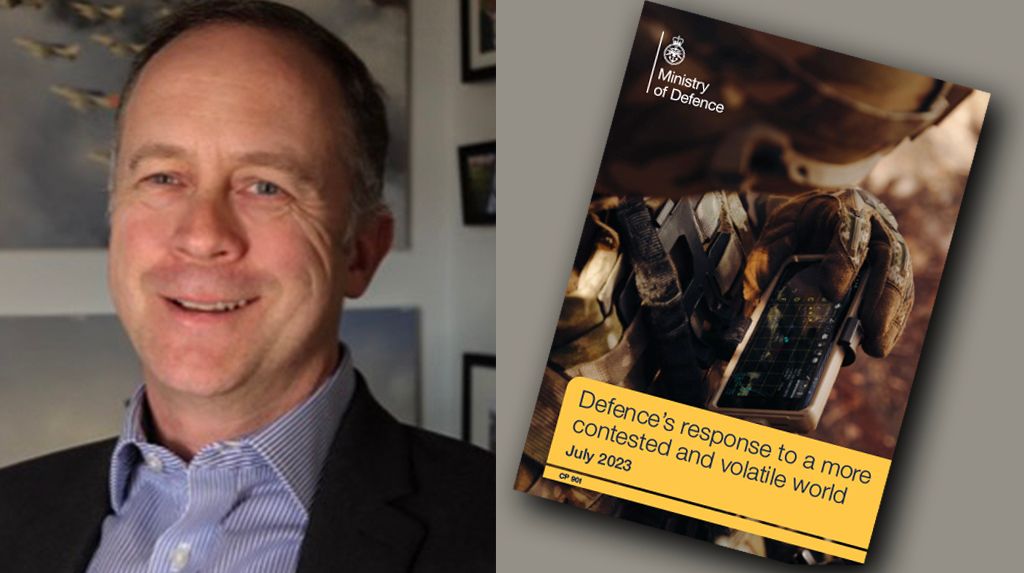
Defence Command Paper 2023 highlighted key strategic priorities for the UK amid the war in Ukraine.
Among crucial areas addressed in light of the war in Ukraine were maintaining proper munitions stockpiles, putting renewed emphasis on deterrence to ward off threats before they occur, and transforming the Defence Forces workforce to deal with sweeping technological changes.
“We need to ensure our warfighting capabilitiesare robust and credible to be able to deter threats from manifesting in the first place, but also to fight and win if they do,” the Command Paper noted.
Analysing the Command Paper’s conclusions with keen interest was Gary Waterfall, retired Air Vice Marshal and now military advisor to DSEI. Waterfall spoke with Defense News about the Command Paper and his views on the readiness of UK Defence Forces. The interview has been edited for length and clarity.
Defense News: You’ve noted that the Ukraine conflict is characterised by a technology revolution, with ubiquitous sensors and mass data collection making it harder for defence forces to hide their positions. You also suggest more could be done to ensure that hardware acquired through the traditional procurement process is kept up-to-date from a technology perspective. In that light, what are some of the biggest challenges facing the Defence Forces?
Waterfall: I think the biggest challenge they’ve got is about the amount of money in the pot to deal with what’s needed to be quite a rapid revolution to harness all this technology and keep it relevant. One of the main areas, and I think it’s drawn a lot of focus over the last six to nine months, has to be [munitions] stockpiles. … And we all know for deterrence to be absolutely perfect, it’s got to be there able to be used at a moment of our choice, and in doing so you’ve got all the capability right across the board.
DN: So what about current readiness?
Waterfall: If your question is, is the UK Defence Force ready and credible to today … participate in a peer-on-peer conflict in Eastern Europe, then I think the answer is yes. Would they like to be more ready? Yes, of course they would like to be more ready and that’s been well-publicized, and particularly the State of the Readiness of the British Army … The UK is doing a lot of work right now to enhance the readiness of all of its capabilities rather than allow them to cycle through high-readiness to low readiness, a bit of fallow, then back to high-readiness.
DN: You’ve spoken about people being the core of the forces. What lessons should be drawn from the Ukrainian resistance?
Waterfall: The way that they can allow effectively every person in Ukraine to become an intelligence node, and contribute to the battle picture to destroy an enemy is quite remarkable. Are we as NATO able do that just as quickly? Probably not. Do we need to invest in greater technologies to bring that to the fore? Yes.
DN: This year’s [2023's] DSEI will feature more than 2,800 defence and security suppliers, including for the first time all 20 traditional prime contractors. But this year will also include several small and midsize enterprises (SMEs) and innovative start-ups. How does this reflect the evolution of the Defence Forces’ relationship with industry?
Waterfall: Often it’s not going to be the big prime that’s got the key to the answer. It’s going to be that small SME that’s just started up, and it will be a tech or a data company that’s going to help get to the solution space a lot quicker. … A big prime has got its process to go through. Meanwhile, coming in from crowd left or crowd right is an SME that’s just happened upon a solution to a question they don’t really know is being faced by that prime community.
DN: You’ve noted that there is a global shortage of “great people wanting to come into the military and do great things.” What’s getting it right for the whole UK force look like?
Waterfall: The whole force at an air station, at a barracks, or at a navy base, is a mixture of contractors, is a mixture of reservists, is a mixture of full-time. When we get this right, people have a zig-zag career. When they need a bit of stability they may leave the forces, then they may come back in when the family’s a bit older, they’re a bit more settled in their approach.
DN: How will Artificial Intelligence and the so-called “uncrewed era” affect that people shortage?
Waterfall: In that fabulous world in the future where it’s all just AI, it’s all just drones flying around, they’re all going to need to be constructed by people, looked after by people. And it’s those people that sit at the bedrock and will do for the foreseeable future.
DN: As you’ve pointed out, the Defence Command paper calls for spending £400 million in the next two years on upgrading military forces’ accommodations. Why does that matter from a retention perspective?
Waterfall: A happy spouse is a happy chap or chappess that goes to work. And the same, because it’s not just about the spouse, it’s about the individual who feels invested in. So when they come home in the evening, they’re in accommodation that they can be proud of.
DN: On the recruitment side, you’ve suggested that upbeat advertisements for military service may or may not work. What’s the long-term solution?
Waterfall: It’s actually an educational thing that from the outset, defence and security is a viable way of looking at your future and your skillset that you’ve got.
DN: Finally, back to Ukraine. As you’ve noted, war is closer to home after two decades of UK involvement in counter-insurgencies elsewhere, a development that will probably be ongoing. What does that mean for the future?
If we wish to make the world a safer place; the way we’re going to do that is by recruiting more talent into the whole force, be that industry or be that the services.
Tags
- 2023
- bit
- command
- defence
- dsei
- force
- forces
- going
- military
- more
- need
- out
- paper
- people
- prime
- priorities
- re
- readiness
- right
- s
- uk
- ukraine
- ve
- war
Providing impartial insights and news on defence, focusing on actionable opportunities.
-
The hub will be established as part of Germany’s land forces, though it is expected to benefit the whole of the country’s military.
-
The US is looking to replace legacy systems with the new platform.
-
The five-pillar plan emphasises the need to shift to a hybrid and restructured force.


)
)
)
